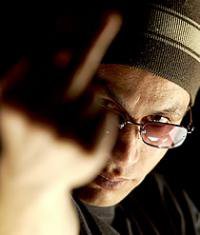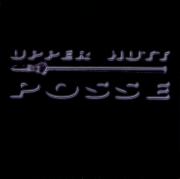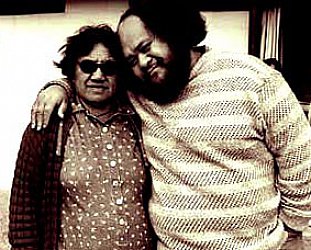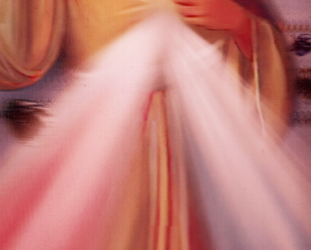Graham Reid | | 2 min read

Dean Hapeta was the mainman in the Upper Hutt
Posse (which also included singer-songwriter Emma Paki), the group which recorded the first New Zealand rap
single E Tu in 1988. It was a powerful (if thin-sounding) statement of Maori anger and unashamedly used te reo (the Maori language) to strident effect. See lyrics below.
Hapeta - as Te Kupu/The Word - has
since carved a distinctive path: he's done spoken-word performances,
made films, and his solo album of 2000, Ko Te Matakahi
Kupu/The Word Which Penetrates, came in English and Maori versions.
On the attention-grabbing 2002 album Upper Hutt Posse: Te Reo Remixes, he revisited 10 Posse tracks, and remixed and reconstructed them with
Maori language vocals. So here Stormy Weather, which features vocals
by Paki, is Te Rangi Paroro and Against the Flow is Atete Te Rere.
From the opener, Te Hono Whakakoro
(Movement in Demand of '95, with samples from the protests at
Waitangi in February 2002) this album bristled with anger and
sometimes punishing beats where hip-hop was welded to haka. But it
also had tracks of great beauty, notably Ka Huri Matapo/As the Blind
See with Paki, which worked over an airy dub track.
E Tu, reworked by DLT and Nick Roughan, became a deeper and darker vision than the wire-thin, now
adolescent-sounding, original. Ragga Girl (Kotiro Maori E) was
similarly readdressed over deep beats, and there was additional
scratching on other tracks, massive bass, and guitar and brutal
stylus work from Rhys B underpinning Tangata Whenua.
These were sometimes radical revisions
of their source material - much more than simply adding a te reo
vocal over the original tracks - and remain powerful, muscular
statements of Maoritanga you would ignore at your peril.
It's a measure of how far Hapeta has
travelled, but how consistent his vision has been, that on this album he
sounded more profound, but the "stand proud" sentiment he
articulated all those years remained the same.
An essential and, I would venture, important album in New Zealand's music landscape. It is available from here.
Dean Hapeta's original lyrics to E Tu
Karanga, rangatahi, whakarongo, whakarongo
We're nga tamatoa, so we must light te ahi
Don't get led astray by Babylon, kia mau ki to Maori
There's a lot of people who think they're tough today
But chiefs like Te Rauparaha woulda blown dem away, Cher!
Hone Heke he expressed his disgust by
cutting down the flagpole, huh
Pakeha killed Maori inna Matawhero
So Te Kooti exacted it in a slaughter.
Yes, the Maori battalion inna World War Two
Staunch on the battlefield they had many clues
Like Moana Ngarimu on hill 209, Victoria Cross so true so strong
Yes the Maori was a bad warrior
Strike fear in the hearts of the Babylon soldier
Yeah its true, yeah its true, that's why I'm talking to you
Kia kaha, kia kaha two one two two
E Tu
Stand Proud
Kia Kaha
Say It Loud . . .







post a comment